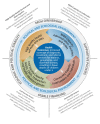Integrated community case management: planning for sustainability in five African countries
- PMID: 31275567
- PMCID: PMC6596361
- DOI: 10.7189/jogh.09.010802
Integrated community case management: planning for sustainability in five African countries
Abstract
Background: The World Health Organization (WHO) launched an initiative to plan for the sustainability of integrated community case management (iCCM) programmes supported by the Rapid Access Expansion (RAcE) Programme in five African countries in 2016. WHO contracted experts to facilitate sustainability planning among Ministries of Health, WHO, nongovernmental organisation grantees, and other stakeholders.
Methods: We designed an iterative and unique process for each RAcE project area which involved creating a sustainability framework to guide planning; convening meetings to identify and prioritise elements of the framework; forming technical working groups to build country ownership; and, ultimately, creating roadmaps to guide efforts to fully transfer ownership of the iCCM programmes to host countries. For this analysis, we compared priorities identified in roadmaps across RAcE project sites, examined progress against roadmaps via transition plans, and produced recommendations for short-term actions based on roadmap priorities that were unaddressed or needed further attention.
Results: This article describes the sustainability planning process, roadmap priorities, progress against roadmaps, and recommendations made for each project area. We found a few patterns among the prioritised roadmap elements. Overall, every project area identified priorities related to policy and coordination of external stakeholders including funders; supply chain management; service delivery and referral system; and communication and social mobilisation, indicating that these factors have persisted despite iCCM programme maturity, and are also of concern to new programmes. We also found that a facilitated process to identify and document programme priorities in roadmaps, along with deliberately planning for transition from an external implementer to a national system could support the sustainability of iCCM programmes by facilitating teams of stakeholders to accomplish explicit tasks related to transitioning the programme.
Conclusions: Certain common elements are of concern for sustaining iCCM programmes across countries, among them political leadership, supply chain management, data processes, human resources, and community engagement. Adapting and using a sustainability planning approach created an inclusive and comprehensive dialogue about systemic factors that influence the sustainability of iCCM services and facilitated changes to health systems in each country.
Conflict of interest statement
Competing interests: To the best of our knowledge, no authors have competing interests in relation to this article. We have tried to reach all authors, but some live and work in remote areas and were unable to respond by the time of the publication of this article. All other authors completed the ICMJE COI form (available upon request from the corresponding author), and declare no conflict of interest.
Figures
References
-
- Rabin BA, Brownson RC, Haire-Joshu D, Kreuter MW, Weaver NL.A glossary for dissemination and implementation research in health. J Public Health Manag Pract. 2008;14:117-23. 10.1097/01.PHH.0000311888.06252.bb - DOI - PubMed
-
- United States Agency for International Development and Maternal and Child Health Integrated Program. Integrated community case management of childhood illnesses: documentation of best practices and bottlenecks to program implementation in the Democratic Republic of Congo (DRC). Available: https://www.mchip.net/sites/default/files/mchipfiles/DRCLongEnglish.pdf. Accessed: 20 May 2018.
MeSH terms
Grants and funding
LinkOut - more resources
Full Text Sources

